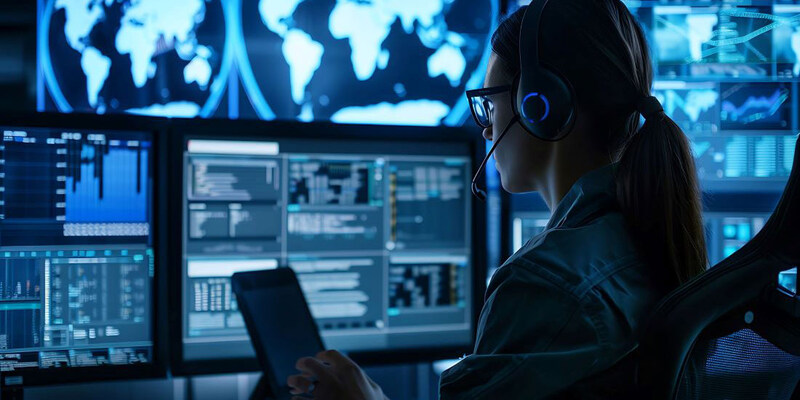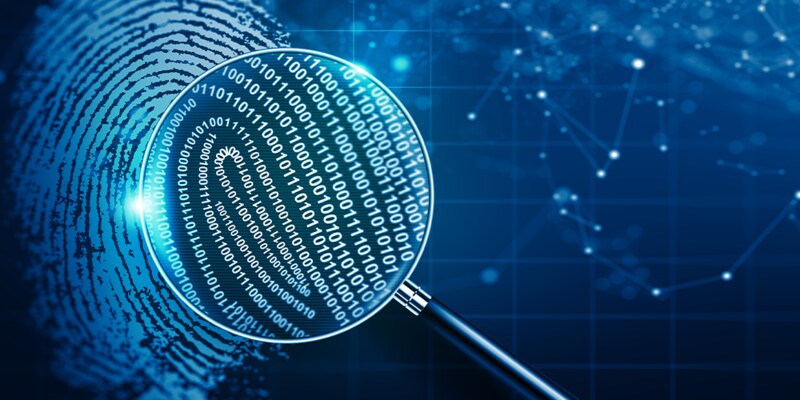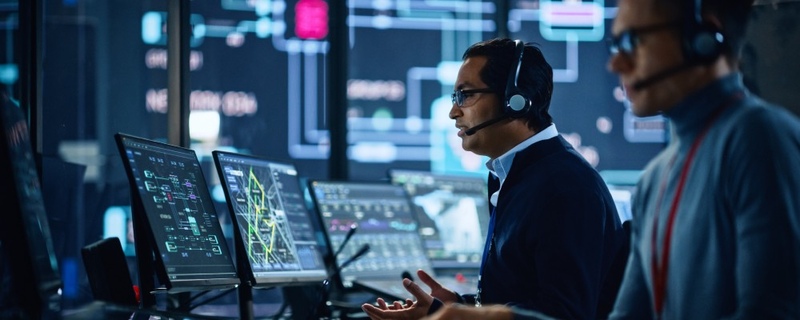In today’s fast-changing world, national security needs advanced, reliable technology more than ever. Blockchain is a promising tool in this area. The National Security Agency and blockchain technology are now closely linked as the NSA explores how to use this technology to enhance defense, protect critical infrastructure, and secure data. This article looks at the strategic value of blockchain and how the NSA uses it to tackle modern security challenges. CryptoMarketPulse highlights the importance of integrating blockchain within the NSA to safeguard national security.
The strategic advantages of blockchain
Strengthening national defense
National defense requires robust systems that can withstand various forms of attacks, both physical and digital. Blockchain technology, with its decentralized and tamper-resistant architecture, offers a new layer of security that is particularly valuable in this context.
By utilizing blockchain, the NSA can ensure that critical data and operations remain secure, even in the face of sophisticated cyber threats. For example, blockchain can be used to secure military communications, ensuring that sensitive information is transmitted securely without the risk of interception or tampering. Additionally, blockchain’s transparency allows for real-time monitoring and verification of data, enabling the NSA to respond quickly to potential threats and ensure the integrity of its operations.
Maintaining the security of digital infrastructure
In today’s digital age, the security of national infrastructure is paramount. Power grids, transportation systems, and communication networks are all vulnerable to cyberattacks, which can have devastating consequences. Blockchain technology provides a solution by creating secure, decentralized networks that are resistant to tampering and unauthorized access.
The NSA is leveraging blockchain to protect these critical systems by implementing blockchain-based solutions that monitor and control access to infrastructure networks. For instance, blockchain can be used to manage and secure access points within a power grid, ensuring that only authorized personnel can make changes or access sensitive data. This level of control and security is essential for preventing disruptions and maintaining the continuous operation of national infrastructure.
Augmenting intelligence capabilities
Intelligence gathering and analysis are core functions of the NSA, and blockchain technology offers new ways to enhance these capabilities. By implementing blockchain, the NSA can create secure, transparent systems for collecting and storing intelligence data. This ensures that the data remains untampered with and can be traced back to its source with full accountability.
For example, blockchain can be used to secure data feeds from various intelligence sources, preventing unauthorized access or manipulation. The immutable nature of blockchain also means that intelligence data can be audited and verified at any time, ensuring that the NSA has access to accurate and reliable information for decision-making. This enhanced capability is critical in an era where misinformation and cyber threats are increasingly prevalent.


NSA’s blockchain initiatives
Key projects and programs
The NSA has been at the forefront of exploring and implementing blockchain technology within its operations. Several key projects and programs have been initiated to integrate blockchain into various aspects of national security.
One notable project involves the use of blockchain to secure communications between government agencies. By creating a decentralized communication network, the NSA can ensure that sensitive information is shared securely and without the risk of interception. Another project focuses on using blockchain to track and verify the integrity of defense contracts, ensuring that funds are used appropriately and without fraud.
These initiatives demonstrate the NSA’s commitment to leveraging blockchain technology to enhance its operations and protect national security.
Joint ventures with private enterprises
In addition to its internal projects, the NSA has also established strategic partnerships with private sector companies to further explore the potential of blockchain. These collaborations allow the NSA to tap into the expertise and innovation of the tech industry, accelerating the development and deployment of blockchain-based solutions.
For example, the NSA has partnered with leading tech companies to develop blockchain-based security systems for protecting government data. These collaborations not only enhance the NSA’s capabilities but also help to establish industry standards for the use of blockchain in national security. By working closely with the private sector, the NSA is able to stay ahead of emerging threats and ensure that its security measures are cutting-edge.
Government-wide blockchain strategies
Blockchain technology is integral not only to the NSA but also to the U.S. government’s overall strategy for strengthening national security. The NSA’s blockchain initiatives are closely aligned with government-wide strategies to integrate advanced technologies into defense and security operations.
For instance, the NSA is working in collaboration with other government agencies to create a unified approach to blockchain implementation. This includes developing standards and protocols for blockchain use across different sectors, ensuring that the technology is applied consistently and effectively. By aligning its blockchain initiatives with broader government strategies, the NSA is contributing to a more secure and resilient national security framework.

Global implications
The connection between blockchain and international security
The use of blockchain in national security has significant global implications, particularly in the context of international security collaborations. In a world where threats are increasingly global, the ability to securely share information and collaborate with allied nations is critical.
Blockchain technology enables secure and transparent communication between nations, fostering trust and cooperation in international security efforts. For example, the NSA can use blockchain to securely share intelligence with allied countries, ensuring that the information remains confidential and tamper-proof. This level of security is essential for coordinating global efforts to combat terrorism, cybercrime, and other transnational threats.
Combating global threats
One of the most significant applications of blockchain in national security is its role in combating global threats. Blockchain technology can be used to track and prevent activities such as terrorist financing and cyberattacks, both of which pose significant risks to global security.
For instance, blockchain can be used to monitor financial transactions and detect suspicious activities that may be linked to terrorism. By creating a transparent and immutable record of transactions, blockchain enables authorities to trace the flow of funds and disrupt terrorist networks. Similarly, blockchain’s decentralized nature makes it an effective tool for defending against cyberattacks, as it reduces the risk of centralized points of failure that can be exploited by attackers.

Challenges and opportunities
Technological challenges
Despite its many benefits, the adoption of blockchain in national security is not without challenges. One of the primary technological challenges is the scalability of blockchain systems. As more data and transactions are added to the blockchain, the system can become slower and less efficient. This is a significant concern for the NSA, which requires systems that can handle large volumes of data in real-time.
To address these challenges, the NSA is investing in research and development to improve the scalability and efficiency of blockchain systems. This includes exploring new consensus mechanisms, such as proof-of-stake, that are less resource-intensive than traditional proof-of-work systems. By overcoming these technological challenges, the NSA can fully realize the potential of blockchain in national security.
Strategic opportunities
While there are challenges, there are also significant opportunities for the NSA to leverage blockchain technology to enhance national security. One of the most promising opportunities is the integration of blockchain with other emerging technologies, such as artificial intelligence (AI) and the Internet of Things (IoT).
For example, blockchain can be used to secure IoT devices, which are increasingly used in national security operations. By creating a decentralized network of devices, the NSA can ensure that these devices operate securely and without interference. Similarly, AI can be integrated with blockchain to enhance data analysis and decision-making processes, providing the NSA with more accurate and actionable intelligence.
The NSA’s strategic focus on these opportunities will be crucial in ensuring that blockchain technology is fully utilized to enhance national security.

Ethical and regulatory factors to take into account
Maintaining equilibrium between pushing boundaries and upholding ethical standards
The use of blockchain in national security raises important ethical considerations, particularly regarding privacy and surveillance. While blockchain offers enhanced security, its transparent nature could potentially infringe on individual privacy rights if not managed carefully.
The NSA must navigate these ethical challenges by ensuring that its blockchain initiatives are designed with privacy in mind. This includes implementing measures such as private blockchains and encryption to protect individual privacy while still achieving security objectives. By balancing innovation with ethics, the NSA can ensure that its use of blockchain is both effective and responsible.
Addressing privacy concerns
Privacy concerns are a significant challenge in the use of blockchain for national security. The NSA must ensure that its blockchain applications do not violate the privacy rights of individuals while still providing the necessary level of security.
One approach to addressing these concerns is the use of zero-knowledge proofs, a cryptographic method that allows data to be verified without revealing the data itself. This allows the NSA to ensure the integrity of data without compromising privacy. Additionally, the NSA is working with legal experts and privacy advocates to develop guidelines and protocols for the ethical use of blockchain in national security.

Exploring the strategic potential of National Security Agency and blockchain technology for future security
Evolving strategic importance
As blockchain technology continues to evolve, its strategic importance in national security is likely to increase. The NSA is already exploring new ways to integrate blockchain into its operations, and this trend is expected to continue as the technology matures.
Future advancements in blockchain, such as quantum-resistant algorithms and enhanced scalability, will further enhance its value in national security. The NSA’s ongoing investment in blockchain research and development will be crucial in ensuring that the agency remains at the forefront of technological innovation and is well-equipped to address emerging threats.
Long-term strategic goals
In the long term, blockchain is expected to play a central role in the NSA’s national security strategy. The agency’s focus on leveraging blockchain to enhance security, protect infrastructure, and improve intelligence capabilities will be essential in ensuring the safety and security of the nation.
As the NSA continues to explore and implement blockchain technology, it will be better prepared to address the challenges of the digital age and ensure that the United States remains secure in an increasingly complex and interconnected world.

In examining the strategic influence of the National Security Agency and blockchain technology, this article delivers essential insights that empower readers to understand the intersection of national security and cutting-edge innovation. The value of this information lies in its clarity and relevance, equipping you with the knowledge to navigate this evolving landscape.


